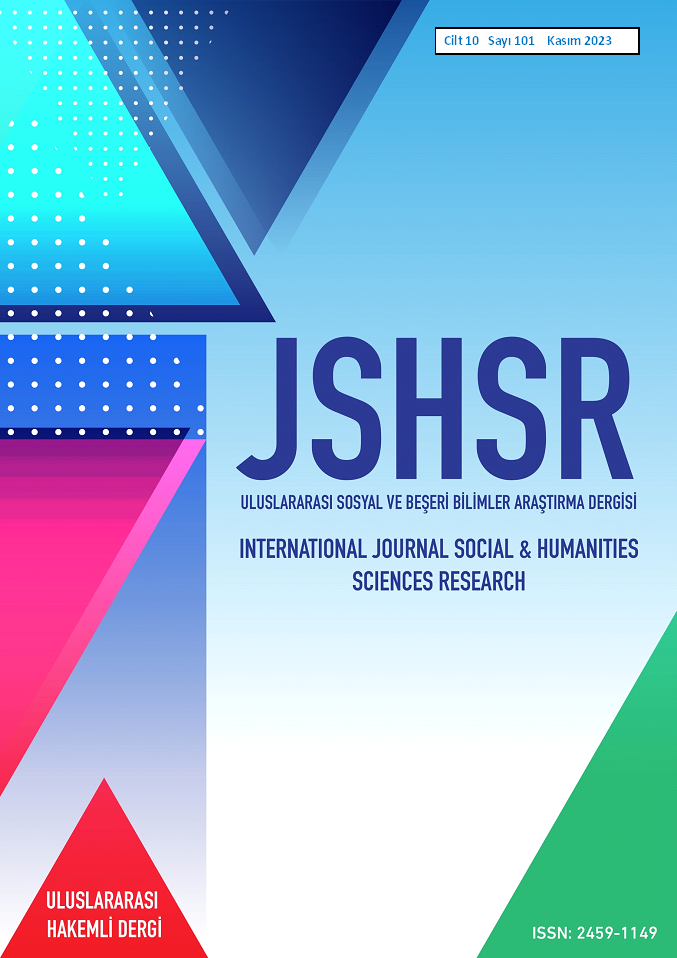Teachers' Opinions on Conflict Management Strategies Applications
DOI:
https://doi.org/10.5281/zenodo.10255918Keywords:
Conflict, strategy, teacher, school, domination, compromise, avoidanceAbstract
This research aimed to determine teachers' opinions about conflict management strategy applications. For this purpose, data was collected from 337 teachers working in Denizli central districts in the 2022-2023 academic year and reached by an easily accessible sampling method. It was observed that the collected data had a high level of reliability and showed a normal distribution. Parametric tests were used in data analysis. As a result of the research, teachers preferred to find common solutions to the highest level problems related to conflict management strategies. It was determined that this was followed by giving importance to both my own interests and needs and the interests and needs of the other party, while the lowest level of disagreement was unconditionally accepting my colleagues' requests. In the sub-dimensions of conflict management strategies, the highest mean was in the integration strategy at the "High" level, followed by the conciliation and compliance strategies at the "High" level, and the avoidance strategy at the "Medium" level. The lowest level is in the “Medium” level domination strategy. It was observed that general conflict management strategies were at a high level. While it was observed that teachers' views on conflict management strategies did not differ according to their training in conflict management, it was determined that there were significant differences according to gender, age, seniority, marital status and education levels. Teachers' views on conflict management strategies were generally higher than those of men, with gender integration, compromise, domination and compliance strategies. It was concluded that while it was high in favor of 36-40 years in the integration, compromise, domination, compliance and general conflict management strategy according to age, it was high in favor of 11-20 years in the integration, compromise, compliance and general conflict management strategy according to their seniority. Teachers' conflict management strategies according to their marital status were higher in favor of married teachers in integration, avoidance, compromise, compliance and general conflict management strategy. According to their education levels, the average of teachers' opinions on conflict management strategies was higher than that of undergraduate graduates in the domination strategy, while the opposite was measured in the compliance dimension.
References
Akkirman, A. D. (1998). Etkin Çatışma Yönetimi ve Müdahale Stratejileri. Dumlupınar Üniversitesi İktisadi ve İdari Bilimler Fakültesi Dergisi, 13(2), 1-11.
Bakioğlu, A. (2009). Çağdaş sınıf yönetimi. Nobel.
Başaran, İ. E. (1991). Örgütsel Davranış. Ankara: Kadıoğlu Matbaası.
Durukan, H. (2004). Eğitim Çatışma ve Yönetimi. TSA, (2-3), 193-198.
Eren, E. (2009). Yönetim ve Organizasyon. Beta Yayınevi.
Folger, J.P., Poole, M.S. ve Stutman, R.K. (2013). Çatışma Yönetimi. F. Akkoyun (çev.). Nobel Yayıncılık
Geçmez, T. (2009). Yöneticilerin Dönüşümcü ve Etkileşimci Liderlik Stilleri ile Çatışma Yönetimi Stilleri Arasındaki İlişki ve Kimya Sektöründe Bir Araştırma. [Yayımlanmamış Yüksek Lisans Tezi]. Marmara Üniversitesi, İstanbul.
Karasar, N. (2016). Bilimsel araştırma yöntemi. Nobel Yayın Dağıtım.
Karip, E. (2013). Çatışma Yönetimi. Pegem.
Koçel, T. (2011). İşletme Yöneticiliği: Yönetim ve Organizasyonlarda Davranış Klasik Modern-Çağdaş Yaklaşımlar. (13. Basım). Beta Basım Yayım Dağıtım A.Ş.
Mayer, R. (1990). Conflict Management-The Courage to Conflict. Ohio: Battle Memorial İnstitute.
Özmen, F.(1997). Fırat ve İnönü Üniversitelerinde Örgütsel Çatışmalar ve Çatışma Yönetimi Yaklaşımları. [Doktora Tezi]. Fırat Üniversitesi, Elazığ.
Rahim, A. (2001) Managing Conflict In Organizations, 3. Baskı, London: Quorum Books.
Tabachnik, B. G. & Fidell, L.S. (2013). Using multivariate statistics (6e éd.). Boston, É.-U. U.: Pearson
Downloads
Published
How to Cite
Issue
Section
License
Copyright (c) 2023 INTERNATIONAL JOURNAL OF SOCIAL HUMANITIES SCIENCES RESEARCH

This work is licensed under a Creative Commons Attribution 4.0 International License.


